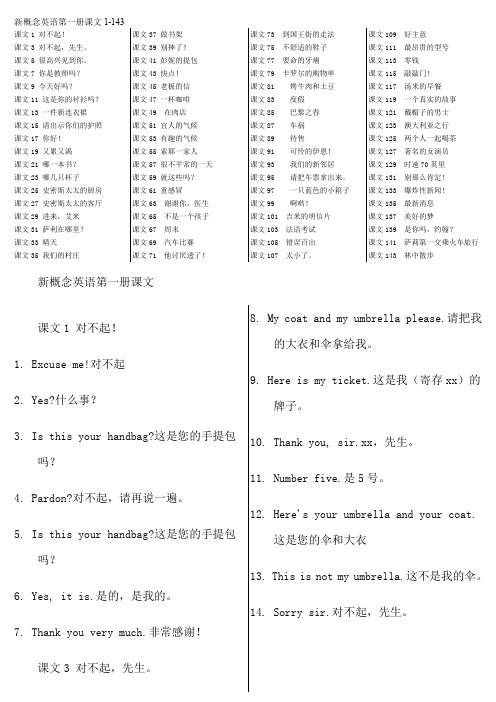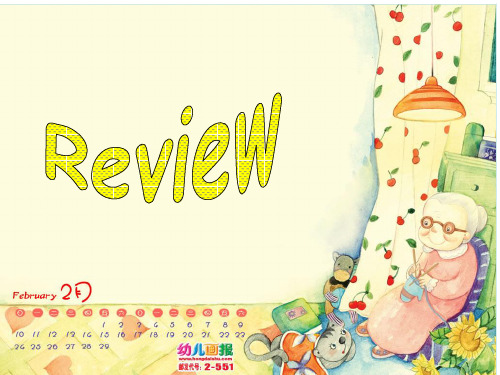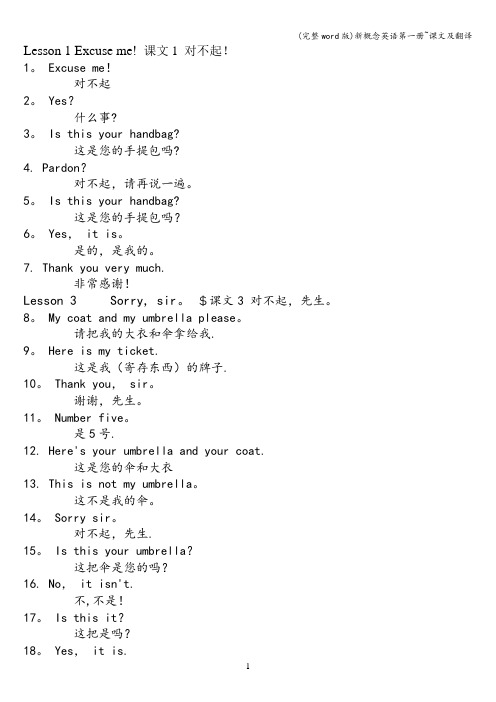新概念英语第一册56课
- 格式:ppt
- 大小:2.51 MB
- 文档页数:45

课文1 对不起!课文3 对不起,先生。
课文5 很高兴见到你。
课文7 你是教师吗?课文9 今天好吗?课文11 这是你的衬衫吗?课文13 一件新连衣裙课文15 请出示你们的护照课文17 你好!课文19 又累又渴课文21 哪一本书?课文23 哪几只杯子课文25 史密斯太太的厨房课文27 史密斯太太的客厅课文29 进来,艾米课文31 萨利在哪里?课文33 晴天课文35 我们的村庄课文37 做书架课文39 别摔了!课文41 彭妮的提包课文43 快点!课文45 老板的信课文47 一杯咖啡课文49 在肉店课文51 宜人的气候课文53 有趣的气候课文55 索耶一家人课文57 很不平常的一天课文59 就这些吗?课文61 重感冒课文63 谢谢你,医生课文65 不是一个孩子课文67 周末课文69 汽车比赛课文71 他讨厌透了!课文73 到国王街的走法课文75 不舒适的鞋子课文77 要命的牙痛课文79 卡罗尔的购物单课文81 烤牛肉和土豆课文83 度假课文85 巴黎之春课文87 车祸课文89 待售课文91 可怜的伊恩!课文93 我们的新邻居课文95 请把车票拿出来。
课文97 一只蓝色的小箱子课文99 啊哟!课文101 吉米的明信片课文103 法语考试课文105 错误百出课文107 太小了。
课文109 好主意课文111 最昂贵的型号课文113 零钱课文115 敲敲门!课文117 汤米的早餐课文119 一个真实的故事课文121 戴帽子的男士课文123 澳大利亚之行课文125 两个人一起喝茶课文127 著名的女演员课文129 时速70英里课文131 别那么肯定!课文133 爆炸性新闻!课文135 最新消息课文137 美好的梦课文139 是你吗,约翰?课文141 萨莉第一交乘火车旅行课文143 林中散步新概念英语第一册课文课文1 对不起!1. Excuse me!对不起2. Yes?什么事?3. Is this your handbag?这是您的手提包吗?4. Pardon?对不起,请再说一遍。


新概念英语第一册课文(全中文) $课文1对不起!1对不起2什么事?3这是您的手提包吗?4对不起,请再说一遍。
5这是您的手提包吗?6是的,是我的。
7非常感谢!$课文3对不起,先生。
8请把我的大衣和伞拿给我。
9这是我(寄存东西)的牌子。
10谢谢,先生。
11是5号。
12这是您的伞和大衣13这不是我的伞。
14对不起,先生。
15这把伞是您的吗?16不,不是!17这把是吗?18是,是这把19非常感谢。
$课文5很高兴见到你。
20早上好。
21早上好,布莱克先生。
22这位是索菲娅23索菲娅是个新学生。
24她是法国人。
25索菲娅,这位是汉斯。
26他是德国人。
27很高兴见到你。
28这位是直子。
29她是日本人。
30很高兴见到你。
31这位是昌宇。
32他是韩国人。
33很高兴见到你。
34这位是鲁明。
35他是中国人。
36很高兴见到你。
37这位是晓惠。
38她也是中国人。
39很高兴见到你。
$课文7你是教师吗?40我是个新学生,41我的名字叫罗伯特。
42很高兴见到你。
43我的名字叫索菲娅。
44你是法国人吗?45是的,我是法国人。
46你也是法国人吗?47不,我不是。
48你是哪国人?49我是意大利人。
50你是教师吗?51不,我不是。
52你是做什么工作的?53我是电脑录入员。
54你是做什么工作的?55我是工程师。
$课文9今天好吗?56你好,海伦57你好,史蒂文58你今天好吗?59很好,谢谢你。
60你好吗?61很好,谢谢。
62托尼好吗?63他很好,谢谢。
64埃玛好吗?65她也很好,海伦。
66再见,海伦。
67见到你真高兴。
68我见到你也很高兴,史蒂文。
69再见。
$课文11这是你的衬衫吗?70那是谁的衬衫?71戴夫,这是你的衬衫吗?72不,先生。
73这不是我的衬衫。
74这是我的衬衫。
75我的衬衫是蓝色的。
76这件衬衫是蒂姆的吗?77也许是,先生。
78蒂姆的衬衫是白色的。
79蒂姆!80什么事,先生。
81这是你的衬衫吗?82是的,先生。
83给你。
84接着!85谢谢您,先生。

新概念英语第一册自学笔记含课后练习答案:Lesson55-56课文详注 Further notes on the text1.go to work, 上班。
由动词 go引导的短语课文中还有:go to school(上学), go to bed(上床睡觉)。
请注意 work, school以及 bed之前不带任何冠词。
2.stay at home, 呆在家里。
与 stay home在意思上相差无几。
前者中的 home是名词,后者中的home是副词。
3.do the housework, 料理家务。
housework是不可数名词。
请比较:do the homework(做作业)。
4.at night, 在夜里。
如果说某日夜里,则用介词 on:on the night of June 2 在6月2日的夜里语法 Grammar in use一般现在时(2)(请参见 Lessons 47~48语法部分。
)一般现在时用于表示一个习惯动作、有规律的行为以及永恒的现象。
一般与时间频度副词和时间短语连用。
这些时间短语有:every day/week/month/year 每日/周/月/年in the morning/afternoon/evening 在上午/下午/晚上at noon/night 在正午/夜里第3人称单数的谓语动词需加以变位,这可分为几种情况:(1)直接加 -s,如:come----comesarrive----arrives(2)以 -sh, -ch, -o 以及 -s结尾的动词加 -es,如:wash----washesgo----goeswatch----watchesdo----does(3)以辅音加 -y结尾的动词,把 -y改成 -i,再加 -es;而元音加-y结尾的动词,只加 -s即可:hurry----hurriescarry----carriesplay----playsstay----stays词汇学习 Word study1.arrive v.(1)到达;到来:We arrived home early. 我们很早就到家了。

【导语】新概念英语⽂章短⼩精悍,语句幽默诙谐,语法全⾯系统。
适合各个阶层的⼈群学习参考。
相信有了新概念英语,你也可以成为“⼤神”级别的⼈物!还在等什么?快来加⼊学习吧!⽆忧考⼩编与您⼀起学习进步!新概念英语第⼀册Lesson51~52重点语法 ⼀、重要句型或语法 1、⼀般现在时 1)表⽰天⽓,如:What's the weather like in spring? It's often windy in March. 2)表⽰⽓候,如:What's the climate like in your country? It's very pleasant. 3)it作主语,表天⽓或⽓候。
2、国籍的问答 Where do you come from? I come from Greece. ⼆、课⽂主要语⾔点 Where do you come from? I come from Greece. 也可以⽤:Where are you from? I am from Greece. What's the climate like in your country? / What's the weather like in spring? 注意区分climate与weather:指某⼀地区总的⽓候情况,如⼲旱、湿润、温度、凉爽等;weather指某地某天的具体天⽓情况,如阴晴、降⽔、⽓温、风⼒、风向等。
It's very pleasant. pleasant来源于please,表⽰“令⼈愉快的”。
在课⽂⾥⽤来修饰天⽓,表⽰“宜⼈的,舒适的”。
It's often windy in March. 此处可介绍表天⽓的名词及其形容词的变化,即在名词后加后缀-y。
此外,也可以介绍⼀年中12个⽉份的表达,可顺便介绍12个⽉的历史故事。
Its' always warm in April and May, but it rains sometimes. 句中的sometimes⼀般位于助动词后⾯和实意动词前⾯,此处放在句末,主要是其强调作⽤。

新概念英语第一册课文翻译及学习笔记Lesson51~56新概念英语第一册课文翻译及学习笔记Lesson51~52 【课文】HANS: Where do you come from?DIMITRI: I come from Greece.HANS: What’s the climate like in your country?DIMITRI: It’s very pleasant.HANS: What’s the weather like in spring?DIMITRI: It’s often windy in March. It’s always warm in April and May, but it rains sometimes.HANS: What’s it like in summer?DIMITRI: It’s always hot in June, July and August. The sun shines every day.HANS: Is it cold or warm in autumn?DIMITRI: It’s always warm in September and October. It’s often cold in November and it rains sometimes.HANS: Is it very cold in winter?DIMITRI: It’s often cold in December, January and February. It snows sometimes.【课文翻译】汉斯:你是哪国人?迪米特里:我是希腊人。
汉斯:你们的国家的气候是怎么样?迪米特里:气候非常宜人。
汉斯:春季的天气怎么样?迪米特里:3月里常常刮风。
4月和5月的天气总暖洋洋的,但有时下雨。
汉斯:夏季的天气如何呢?迪米特里:6月、7月和8月的天气总是炎热的每天都出太阳。

新概念英语第一册55-56课详解Lesson 55-56 of New Concept English Book 1 Detailed Explanation.Lesson 55: The Sawyer Family.Vocabulary and Expressions:live [lɪv] v.: This verb has multiple meanings. Firstly, it can mean to reside or habitually inhabit a place. For example, "I live in Hefei." Secondly, it can mean to exist or be alive, as in "People cannot live without air." Lastly, it can be used in the expression "live a/an... life" to describe the way someone lives their life.stay [steɪ] v.: This Verb primarily means to remain in a place for a period of time. It can also be used figuratively to mean "remain" in a certain state or condition, as in "stay hungry, stay foolish."home [həʊm] n./adv.: As a noun, it refers to the place where one lives. As an adverb, it means "to the place where one lives," as in "go home."housework ['haʊswɜːk] n.: This noun refers to the tasks related to maintaining a household, such as cleaning, cooking, and laundry.lunch [lʌnʃ] n.: This noun refers to the meal eaten in the middle of the day.afternoon [ɑːftə'nuːn] n.: This noun refers to the period of time between noon and evening.Text Explanation:Lesson 55 introduces the Sawyer family and their daily routine. The lesson begins by introducing the family members and their occupations. Mr. Sawyer works in an office, while Mrs. Sawyer stays at home. The children go to school. The lesson then goes on to describe their eveningactivities. Mr. Sawyer usually arrives home from work at about five o'clock, and the family then has their lunch together. In the afternoon, they often have a rest, andthen in the evening, they usually stay at home and watch television.Grammar Points:The use of "-s" or "-es" to form the third-person singular present tense of verbs is reinforced in this lesson. For example, "Mr. Sawyer usually arrives home from work at about five o'clock."The use of prepositions with "live" is also introduced. For example, "Mr. Sawyer lives in a town near London,"where "in" is used with a large place, and "Mrs. Sawyerlives at 87 King Street," where "at" is used with aspecific address.Lesson 56: What Do They Do?Vocabulary and Expressions:together [tə'geðə] adv.: This adverb means "in a group" or "side by side."evening ['iːvnɪŋ] n.: This noun refers to the time of day that comes after afternoon and before night.arrive [ə'raɪv] v.: This Verb means to reach a destination after a journey.night [naɪt] n.: This noun refers to the period of time from sunset to sunrise.Text Explanation:Lesson 56 continues the theme of the Sawyer family's daily life by asking the question, "What do they do?" The lesson provides information about the family's evening activities. Mr. Sawyer usually arrives home from work at about five o'clock, and then the family has their tea together. After tea, they usually sit in the living room and watch television. Sometimes, they go to the cinema orto the theater. On Sundays, they often go for a walk in the park.Grammar Points:The present tense of verbs is reinforced in this lesson, particularly the use of the third-person singular form.The lesson also introduces the use of modal verbs such as "can" and "usually" to express ability and frequency.Conclusion:Lessons 55 and 56 of New Concept English Book 1 focus on the Sawyer family's daily routine and activities. These lessons introduce new vocabulary and expressions related to family life, daily activities, and grammar points such as the use of "-s" or "-es" in the third-person singular present tense and the use of modal verbs. By learning these lessons, students can improve their understanding of family life in English-speaking countries and enhance theirlanguage skills in areas such as vocabulary, grammar, and comprehension.。


新概念英语第一册第55-56课:The Sawyer familyLesson 55 The Sawyer family索耶一家人Listen to the tape then answer this question. When do the children do their homework?听录音,然后回答问题。
孩子们什么时候做功课?The Sawyers live at 87 King Street.索耶一家住在国王街87号。
In the morning, Mrs Sawyer goes to work and the children go to school.早上,索耶先生去上班,孩子们去上学。
Their father takes them to school every day.父亲每天送孩子们去上学。
Mrs Sawyer stays at home every day. She does the housework.索耶夫人每天呆在家里。
她料理家务。
She always eats her lunch at noon.她总是在正午吃午饭。
In the afternoon, she usually sees her friends. They often drink tea together.下午,她总是会见她的朋友。
她们经常在一起喝茶。
In the evening, the children come home from school. They arrive home early.傍晚,孩子们放学回家。
他们到家很早。
Mr Sawyer comes home from work. He arrives home late.索耶先生下班回家。
他到家很晚。
At night, the children always do their homework. Then they go to bed.晚上,孩子们总是做作业,然后去睡觉。

新概念英语第一册56课课文原文《新概念英语第一册》第56课的课文原文如下:Lesson 56 The best and the worst.Many things in life are good, many are bad. There are many ways of doing things, some of which are good, some of which are bad. Some people are kind, others are unkind. Some people are honest, others are dishonest. Some people are polite, others are rude. Some people are generous, others are mean. Some people are helpful, others are unhelpful. Some people are considerate, others are inconsiderate. Some people are patient, others are impatient. Some people are courageous, others are cowardly. Some people are confident, others are shy. Some people are optimistic, others are pessimistic. Some people are ambitious, others are not. Some people are hardworking, others are lazy. Some people are responsible, others are irresponsible. Some people are reliable, others are unreliable. Some people are disciplined, others areundisciplined. Some people are organized, others are disorganized. Some people are punctual, others are always late. Some people are tidy, others are messy. Some people are calm, others are easily upset. Some people are flexible, others are inflexible. Some people are adventurous, others are cautious. Some people are open-minded, others areclose-minded. Some people are fair, others are unfair. Some people are forgiving, others are resentful. Some people are humble, others are arrogant. Some people are content,others are always wanting more. Some people are grateful, others are ungrateful. Some people are joyful, others are constantly unhappy.In conclusion, life is full of contrasts. It is up tous to choose the best and avoid the worst.。



新概念英语第一册课文翻译及学习笔记Lesson51~56新概念英语第一册课文翻译及学习笔记Lesson51~52【课文】HANS: Where do you come from?DIMITRI: I come from Greece.HANS: What's the climate like in your country?DIMITRI: It's very pleasant.HANS: What's the weather like in spring?DIMITRI: It's often windy in March. It's always warm in April and May, but it rains sometimes.HANS: What's it like in summer?DIMITRI: It's always hot in June, July and August. The sun shines every day.HANS: Is it cold or warm in autumn?DIMITRI: It's always warm in September and October. It's often cold in November and it rains sometimes.HANS: Is it very cold in winter?DIMITRI: It's often cold in December, January and February. It snows sometimes.【课文翻译】汉斯:你是哪国人?迪米特里:我是希腊人。
汉斯:你们的国家的气候是怎么样?迪米特里:气候非常宜人。
汉斯:春季的天气怎么样?迪米特里:3月里常常刮风。
4月和5月的天气总暖洋洋的,但有时下雨。

Lesson 5 Nice to meet you!Lesson6 What make is it?Keywords:1.★Mr. 先生加在男性的姓氏前面Mrs. 夫人(已婚的)(随夫姓)Ms. 女士(不表明婚姻状况)Mr. / Mrs. / Miss后面只能加姓或者全名,不能直接加名字。
John Blake,可以称呼为Mr. Blake或Mr. John Blake,但是不能说Mr. John。
2.★ makeV 制造,做He is making a cake.N. (产品的)牌子,型号,类型What make is it?3.★国名和某国人(详细见后表)China – Chinese America – American England – English4.★ This is Miss Sophie Dupont.This is …… 这是……介绍物品或者人注意:介绍人是有顺序的,一般是先年长后年轻,先上级后下级,先女士后男士。
外国人的姓名一般有三个部分: First name + Middle name + Last nameGiven name + Middle name + Family name对照:中国人是姓在前名在后,外国人是名在前姓在后。
5. Nice to meet you.用于初次相识或被人介绍时打招呼回答:Nice to meet you, too. 也可以说Me, too.类似的表达,例如Glad/happy/pleased to meet/see you.正式的说法是:-How do you do? -How do you do?6. Sophie is a new student.冠词a/an用在单数可数名词之前,表泛指,尤其是第一次出现时。
a 用于元音因素前,an 用于辅音因素前。
注意的字母:h/u 词:an hour a house an umbrella a university语法1.★冠词: 定冠词和不定冠词a,an是不定冠词,一个(1)a/an有不确定的意义(即所说的人、动物或东西对听者或读者来说可能是不知道的)。

Lesson 1 Excuse me! 课文1 对不起!1。
Excuse me!对不起2。
Yes?什么事?3。
Is this your handbag?这是您的手提包吗?4. Pardon?对不起,请再说一遍。
5。
Is this your handbag?这是您的手提包吗?6。
Yes, it is。
是的,是我的。
7. Thank you very much.非常感谢!Lesson 3 Sorry, sir。
$课文3 对不起,先生。
8。
My coat and my umbrella please。
请把我的大衣和伞拿给我.9。
Here is my ticket.这是我(寄存东西)的牌子.10。
Thank you, sir。
谢谢,先生。
11。
Number five。
是5号.12. Here's your umbrella and your coat.这是您的伞和大衣13. This is not my umbrella。
这不是我的伞。
14。
Sorry sir。
对不起,先生.15。
Is this your umbrella?这把伞是您的吗?16. No, it isn't.不,不是!17。
Is this it?这把是吗?18。
Yes, it is.是,是这把19. Thank you very much。
非常感谢.Lesson 5 Nice to meet you $课文5 很高兴见到你。
20。
Good morning。
早上好。
21. Good morning, Mr。
Blake。
早上好,布莱克先生。
22. This is Miss Sophie Dupont。
这位是索菲娅。
杜邦小姐.23. Sophie is a new student.索菲娅是个新学生。
24. She is French。
她是法国人.25。
Sophie, this is Hans.索菲娅,这位是汉斯.26。